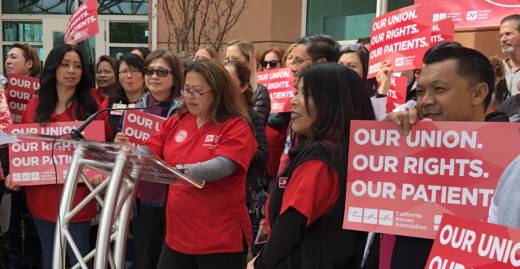Nurses protested outside San Mateo Medical Center in front of a sign that read “Patient safety comes from union strength" last week. They wore the characteristic bright red shirts of their own union: the California Nurses Association (CNA).
They were calling attention to the U.S. Supreme Court case Janus vs. American Federation of State, County and Municipal Employees. The outcome of the case could dramatically weaken public sector unions if the court overturns a rule that requires non-union employees at union-affiliated workplaces to pay "fair share" fees.
Public sector employees who are not union members are required to pay these fees because the union's collective bargaining is meant to benefit all employees equally, whether they're full-fledged union members or not. Opponents of this rule say mandatory union fees violate First Amendment rights.
In addition to San Mateo Medical Center, nurses demonstrated at six other hospitals around the state to advocate for the preservation of the current union rule.
Margarita Harrington is a nurse with the San Mateo County Health System. She thinks that if people do not have to pay "fair share" fees, they probably won't. And that will squeeze unions like hers, despite CNA's 86,000-person member base.
